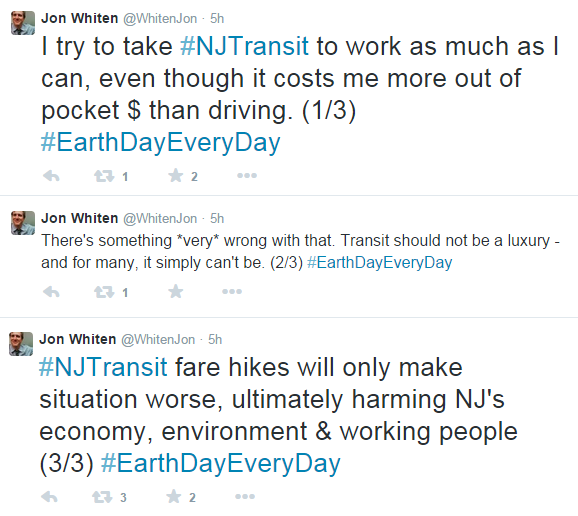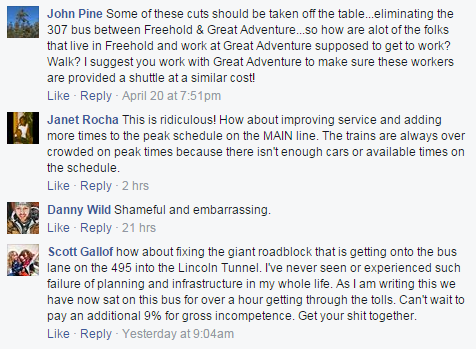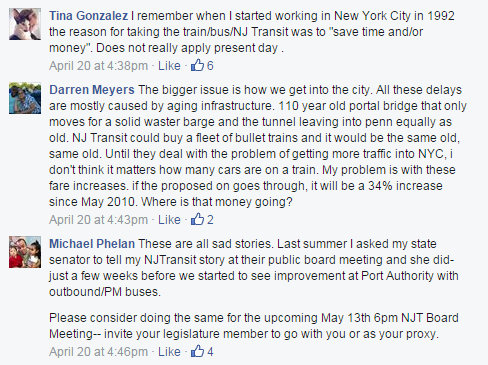“Hell hath no fury like a commuter facing a fare hike,” NJ Advance Media reporter Larry Higgs wrote this week. You’ve probably heard by now about New Jersey Transit’s proposed 9 percent fare increase. Here’s a taste of how people are reacting to it:
The Bergen Record published an editorial on the fare hike, and they didn’t mince words:
The same agency that left its trains in a swamp and in a city known for its flooding during Superstorm Sandy, and that left tens of thousands of riders waiting hours for trains after the 2014 Super Bowl, expects commuters to just take it on the chin. No way. […]
The Christie administration continues to apply Band-Aids instead of addressing the structural flaws in the state’s transportation funding policies. Gimmicks don’t take commuters very far, particularly when the state’s transit agency is cutting back service.
New Jersey Association of Railroad Passengers Board Member Les Wolff, said “Nobody wants fare increases. Why should we be paying more for the lousy service we’re getting?”
Tri-State Transportation Campaign Executive Director Veronica Vanterpool called New Jersey’s transportation funding structure “broken,” and said “transit riders alone should not be responsible for fixing it.” Janna Chernetz, TSTC’s Senior New Jersey Policy Analyst (and also an NJ Transit rider) pointed out that “Since 2002, there have been four fare increases,” while “a key source of revenue to replenish the [Transportation Trust Fund], the gas tax, has not been increased in 27 years.”
One slice with #NJTransit fare hikes, one slice with #NJ #gastax increases. pic.twitter.com/c8X1Ug8Bj3
— Tri-State Transportation Campaign (@Tri_State) April 20, 2015
David Peter Alan, president of the Lackawanna Commuter Coalition, pointed out that when fares go up, transit riders sometimes turn to driving. “Every fare increase on NJ Transit, when there is no similar increase on users of the highway causes some migration.”
Elected officials also spoke out against the proposed fare hike. State Senator Jennifer Beck echoed Alan’s sentiment: “Commuters will just stop taking the trains if the numbers go too high, it’s counter intuitive to where this state should be going with mass transit.”
Assemblyman John Wisniewski said in a statement that the fare increase proposal is “emblematic of a larger problem plaguing this administration – a complete lack of foresight when it comes to public transportation planning.”
Assemblywoman Amy Handlin said “If a business were to raise its rates in that fashion, that business would be out of business very, very quickly.”
Assembly Speaker Vincent Prieto also put out a statement, in which he said he is “appalled at this terrible approach to transportation policy and astonished by the lack of regard for the working people of New Jersey who rely on NJ Transit to make ends meet.” Along with many others, Speaker Prieto also chimed in on Twitter:
.@NJTRANSIT Fare Hike Plan is awful — NJ deserves better than haphazard fare hikes and service cuts #NoFareHike http://t.co/7xhCFVL5wz
— Vincent Prieto (@VincentPrieto) April 20, 2015
New Jersey Policy Perspective Deputy Director Jon Whiten made a connection between the proposed fare hike and Earth Day:
And of course, there was no shortage of commentary about the fare increase on the official NJ Transit Facebook page:

And on the Delayed on NJ Transit Support Group Facebook page:


[…] Speaker Vincent Prieto and Deputy Speaker John Wisniewski — In response to NJ Transit’s recently-proposed fare hike and service reductions, Transportation Committee Chairman Wisniewski and Speaker […]
In terms of inflation the fare increase just brings fares to where they were 5 years ago in constant dollars. The Federal Reserve target inflation rate is 2 percent per year meaning that on average everything that New Jersey Transit buys goes up by 2 percent a year. The transit rider is already getting a larger subsidy than the automobile driver. The buses get the same road subsidy and street parking subsidy as the automobile. Tax and toll dollars are paying for the new buses and any new rail equipment. Yet both bus and rail divisions don’t fully cover operating expenses from the farebox while the automobile driver covers all operating expenses other than parking and pays for the vehicle out of pocket. Also given that New York state is collecting the income taxes and sales taxes on money spent and earned in that state, New York state should be subsidizing the cross border operation of NJT. If Pennsylvania has a non-resident income that is paid by New Jersey residents, then it too should be helping support NJT.
If NJ raised the gas tax much of it would be paid by out of staters. If the transit fare is raised I guess more residents would pay. With an reasonable increase in gas tax our gas would still be cheaper than surrounding states.
@Dan
“Yet both bus and rail divisions don’t fully cover operating expenses from the farebox while the automobile driver covers all operating expenses other than parking and pays for the vehicle out of pocket”
I know a bridge named Pulaski that would like to disagree with you.
Both the bus and the automobile get the same road subsidy (the bus may get more because I believe that New Jersey is one of the states that doesn’t charge fuel excise tax on fuel bought by transit agencies. Parking and bus stops are subsidized for both . Rail station costs are probably in a separate budget from operating costs. Also why should NJT subsidize trips to New York when New York gets the income tax revenue? Should the subsidy be per rider trip or rider mile? If the latter are we subsidizing sprawl? While I would agree fuel excise tax should keep pace with inflation and I could support having the state sales tax on top of that as is done in Canada, that also means that transit fare should go up with inflation.
Just in case I wasn’t clear road costs are not a part of operating costs for either bus or automobile. Not being familiar with NJT accounting I can’t say whether track, signaling and station maintenance costs are in the operating budget.
[…] transit riders had better representation on the board, especially now that they may be facing yet another fare increase. Today, the voice of riders is only heard during public testimony or via SCOREcard […]
[…] like the show must go on with fare hikes and service cuts for New Jersey Transit riders. The strong opposition and calls to fix New Jersey’s broken transportation funding structure have evidently fallen […]